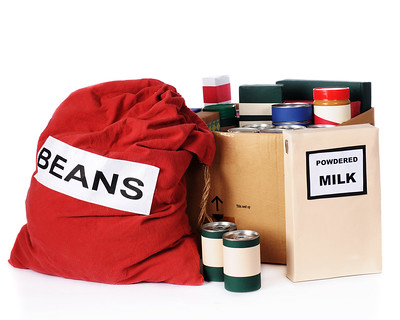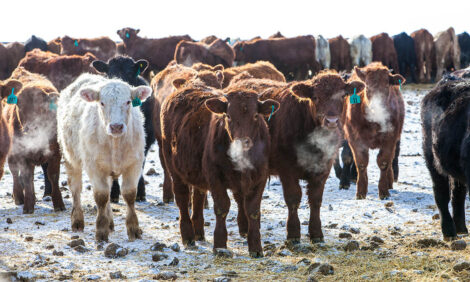



Front line food relief amid COVID-19 part 1 – Granville Community Kitchen
How are local food relief organisations coping with the ongoing pandemic?As the coronavirus pandemic continues to roil global markets and food supply chains, thousands of furloughed and newly unemployed workers face an uncertain economic future. As social safety nets contend with increased claims, food banks and community kitchens are stepping in to provide vital relief to people who are food insecure.
As COVID-19 persists, these organisations face surging demand from new demographics and must deal with clients who are potentially infected. Many have overhauled their systems to address these challenges, but the long-term viability of these projects is far from certain.
Farm Gate host ffinlo Costain sat down with three different food relief organisations in the United Kingdom and United States to learn more about their day-to-day experiences of providing aid. He also explores how society can better serve those who are food insecure and how we can change the food system when we emerge from the pandemic.
Surging demand at Granville Community Kitchen
Costain’s first interview was with Dee Woods, chair of London’s Independent Food Aid Network. She runs the Granville Community Kitchen, a community-led organisation that facilitates access to healthy, sustainable and affordable food for South Kilburn, part of the London boroughs. The Community Kitchen packages free food parcels for clients to either pick up or have delivered to their homes once a week.

Since the start of the coronavirus pandemic, community kitchens and food banks across the UK have experienced a surge in demand. Woods reports the same trend in Granville.
“Demand has literally doubled,” she begins. Since the Community Kitchen is the only food aid option in many of the London boroughs, they are fielding more requests from outside their catchment area. Food deliveries have been steadily increasing, and as the pandemic marches on, Woods expects things to get worse.
The demographics of their clientele have changed during the pandemic. More families are availing of their services and the working poor are more reliant on the organisation than they were previously.
Woods reports an increase in both gig workers and regular jobholders who have been furloughed or sent home. Many of the new clients have limited access to savings or regular finances. Some may have no recourse to public funds at all.
Woods believes that the changing customer base can be attributed to suspended school meal programmes. Since UK schools have closed as part of lock down and social distancing orders, families can no longer rely on free or reduced-cost meal schemes. The Community Kitchen is bridging the gap.
Some of the logistics that accompany the UK’s social safety net are becoming difficult to navigate as the pandemic continues. Government-issued food vouchers can only be used in certain grocery stores – meaning that recipients must travel to non-local supermarkets to shop. This can be challenging under normal circumstances, but it becomes nearly impossible if families are subjected to pandemic-related travel restrictions or need to self-isolate.
Safety concerns as the pandemic wears on
Dee Woods has always prioritised the safety of the Community Kitchen’s staff, volunteers and clients, but coronavirus makes health and safety protocols more urgent. In her interview with Costain, she stresses that all staff members are following NHS guidelines for frontline businesses.

The team wears personal protective equipment (PPE) and maintains social distance. Their packing and sanitising routine now extends beyond regular surfaces to include door handles and light switches. They only allow one pick-up at a time for food parcels. Delivery methods have shifted away from an in-person service to slow the spread of the virus. Instead of entering homes to deliver parcels, staff and volunteers leave food on doorsteps.
Though these steps will preserve the health of Granville’s staff and volunteers, Woods fears that they could face threats to their physical safety as the pandemic continues. The kitchen is struggling to source food, and clients are facing greater food and economic insecurity as the UK lockdown persists.
“[Even though we’re safe for now,] my concern is that as food supplies dry up, people may start becoming violent,” she says. She fears that as people become more desperate, they may become unruly and abusive towards staff at the kitchen.
Where policy shortfalls can sting
When asked how she would reform the UK’s food system, Woods says that policymakers expect organisations like the Community Kitchen to pick up the shortfall from official programmes. This piecemeal approach is difficult under normal circumstances, but the pandemic reveals just how threadbare the UK’s system is. “We shouldn’t have to exist,” she says.
In her time leading the Independent Food Aid Network, she’s noted that the UK has an ongoing issue with food access. Many boroughs and neighbourhoods are “food deserts” and residents are unable to source nutritious food. Poverty compounds the challenges of food insecurity. Woods reports that many of Granville’s clients don’t have access to refrigeration or cooking facilities. This makes it difficult to implement long-term solutions that would make clients more resilient to economic shocks.
The pandemic has brought many of these underlying vulnerabilities to the surface – making the need for policy changes more apparent.
In terms of immediate policy proposals, Woods feels that lawmakers should put cash directly in the hands of people who need it. Whether this was in the form of upgraded benefits, a national living wage or universal income, giving recipients access to cash would improve their food security. She also stressed that the UK’s five-week waiting period to access benefits needs to be revised – it makes it more difficult those who need urgent help.
Woods advocates for legislation that enshrines and protects the right to food in the UK. In her view, this right should encompass access and quality. This would make the legislation more impactful and ensure that people living in the UK will be able to source food that is healthy and culturally appropriate.
Listen to the full interview with Dee Woods here.


